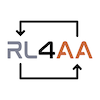Speakers
Description
The optimisation and control of particle accelerators present significant challenges due to the limited availability of beam time, high computational costs, and the complexity of the underlying physics. Machine learning has emerged as a powerful tool to address these challenges, but its application is hindered by the scarcity of high-quality data and the computational intensity of traditional simulation methods. Here, we introduce Cheetah, a Python-based simulation package that leverages PyTorch for differentiable beam dynamics simulations, offering a solution that is up to seven orders of magnitude faster than existing codes. Cheetah's automatic differentiation capability enables the integration of machine learning techniques directly with particle accelerator physics, facilitating advanced applications such as reinforcement learning-trained optimisers, gradient-based actuator tuning and system identification, physics-based priors for Bayesian optimisation, and modular neural network beam dynamics surrogate modelling. Our results demonstrate the practical utility of Cheetah in real-world settings, including the successful application on five example applications, highlighting its potential to significantly advance the field of accelerator physics through the integration of machine learning methodologies.
| Possible contributed talk | No |
|---|

